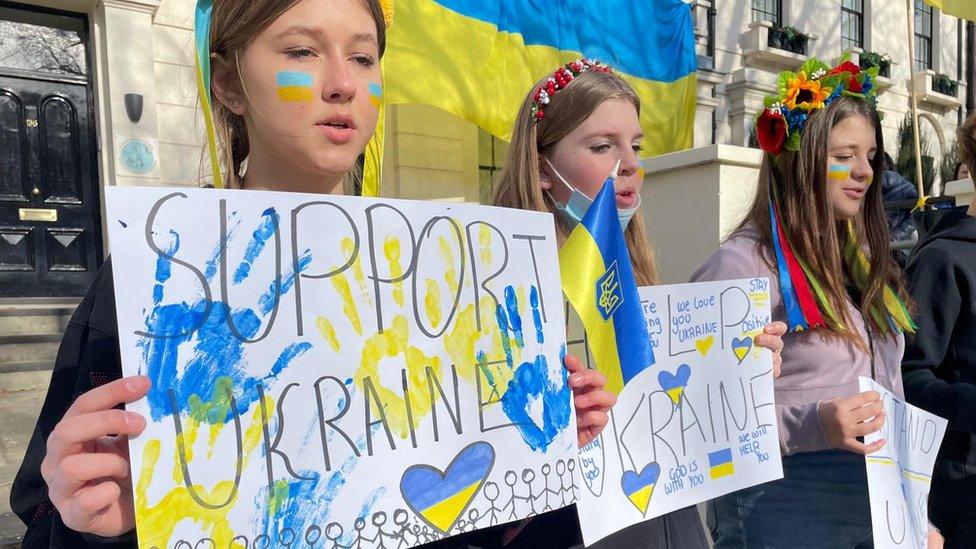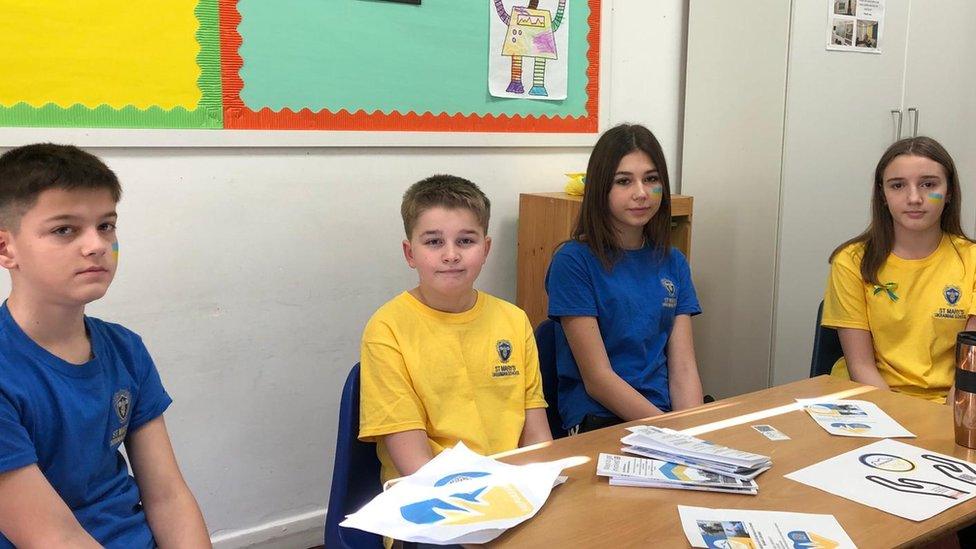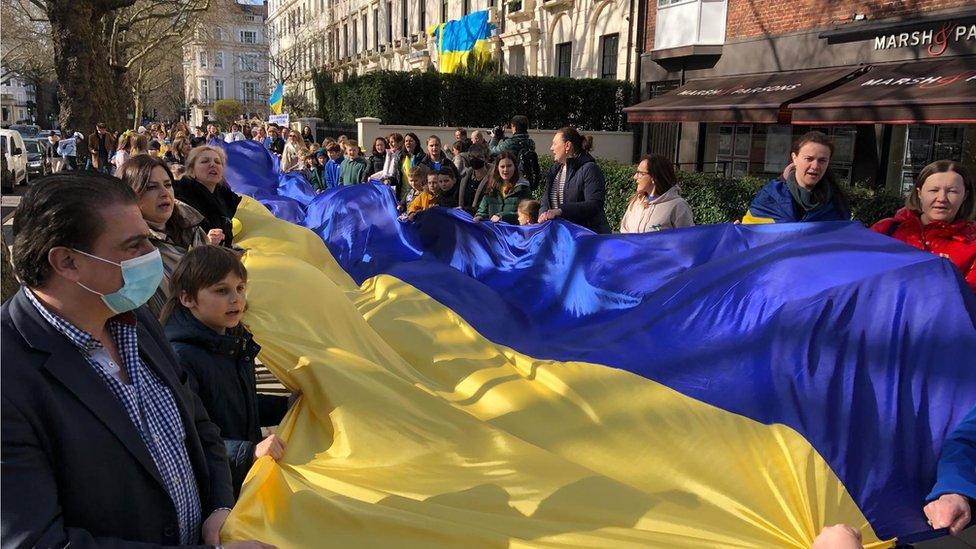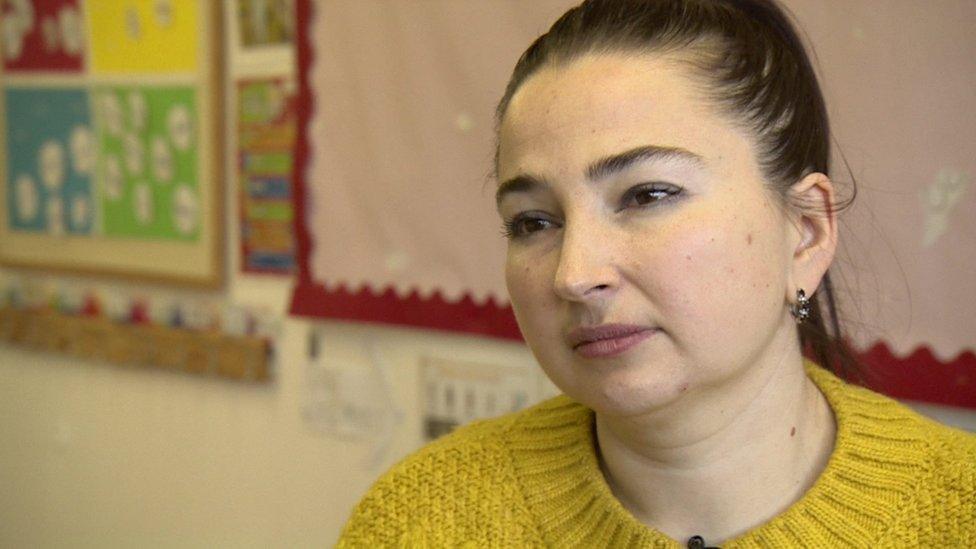Ukrainian children in London: 'We are worried about our families'
- Published

Children from St Mary's Ukrainian School in Holland Park, west London, spent their Saturday morning protesting against the invasion of their homeland
They may be more than 1,000 miles away, but the thoughts of young Ukrainians living in London are firmly with their families back home.
"I feel very worried because that's my family. My grandmother, my grandfather," Denys tells me at his community Ukrainian school in Holland Park, west London.
"I feel very sad for them and I hope everything will be alright in my country because it's my home, that's where I was born," he adds.
His friend Angelina told me her fears. She said: "I'm worried as all of my family is there, my aunties and uncles, my grandparents.

(L to R) Denys, Alex, Tina and Angelina all expressed their concern for loved ones
"They're planning on staying there but I don't want them to, I want them to come here because I feel like they're going to be safer with us. They're trying to help - that's why they're staying there - so I understand but I'm scared as well."
While Alex said: "It makes me feel very worried and the news says everything what's happening on the battlefield, so sometimes I even cry."
Allow X content?
This article contains content provided by X. We ask for your permission before anything is loaded, as they may be using cookies and other technologies. You may want to read X’s cookie policy, external and privacy policy, external before accepting. To view this content choose ‘accept and continue’.
Since the conflict between Russia and Ukraine escalated, St Mary's Ukrainian School in Holland Park has been focusing on fundraising for both the humanitarian and military efforts back home.
While expressing their feelings on the situation has been tough, one thing is clear: they feel the need to be with fellow Ukrainians and to help the people back home in any way they can.

The school went to Downing Street to protest against the invasion
Earlier on Saturday, the school of about 100 pupils - which convenes at the weekends and supports the culture and language of Ukraine for expat children - marched with a 40m (130ft) Ukrainian flag to Downing Street to protest against what is happening.
"It makes me feel really worried, especially when people my age might be making jokes about the topic," said Tina.
"I know sometimes people use humour but I think it's really disrespectful since I don't think they really realise how serious the actual war is and what's going on in Ukraine. Raising awareness and protesting, I think that will help to spread awareness," she added.
'The children want to act'
Head teacher Inna Hryhorovych said what happened on Thursday "shook them all".
"We could see for the first time fear in their eyes," she said.

Head teacher Inna Hryhorovych says the "vibe is more positive", because the children can gather and express their feelings
"We need to be really aware of that because some of the children talk about that - some hide it and avoid to talk - so we sent a message around to the schoolteachers to say we should be really careful of how we bring up the news, how we explain the news.
"They want to be supportive, they want to do something, and when they're here today I think the vibe is more positive."
Ms Hryhorovych added: "The children want to act. They don't want to just use the privilege of clear skies and continue with their lives."
'Not just a Ukrainian war'
The Saturday school has been running for more than 60 years and teaches pupils about Ukrainian language, culture and history.
Ms Hryhorovych said that since Russia annexed Crimea in 2014, the school had taught its pupils what was happening in their home country and the teachers and children had spoken about fundraising efforts to aid those back in Ukraine.
"The children said they would like to fundraise for those who are the same teenagers, the same ages as they are, but not as privileged to live far away from the aggressor. That's the only difference.
"We tried to tell them that we are going to win, we try to convince them about the positive outcome, but we need to make sure we stand to the promises to the children.
"They know this is not just a Ukrainian war, it's a war of the world against the dictatorship, against the aggression, so by saving Ukraine, we're saving democracy."